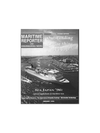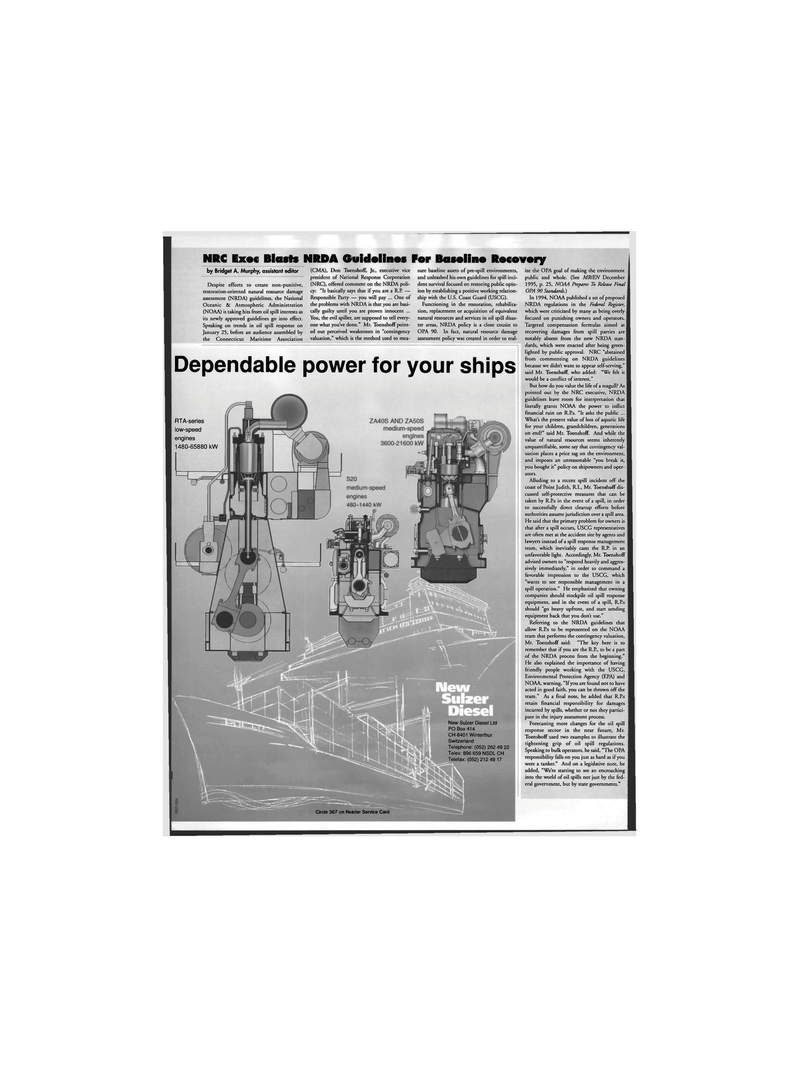
Page 12: of Maritime Reporter Magazine (February 1996)
Read this page in Pdf, Flash or Html5 edition of February 1996 Maritime Reporter Magazine
NRC Exec Blasts NRDA Guidelines For Baseline Recovery by Bridget A. Murphy, assistant editor
Despite efforts to create non-punitive, restoration-oriented natural resource damage assessment (NRDA) guidelines, the National
Oceanic & Atmospheric Administration (NOAA) is taking hits from oil spill interests as its newly approved guidelines go into effect.
Speaking on trends in oil spill response on
January 25, before an audience assembled by the Connecticut Maritime Association (CMA), Don Toenshoff, Jr., executive vice president of National Response Corporation (NRC), offered comment on the NRDA poli- cy: "It basically says that if you are a R.P. —
Responsible Party — you will pay ... One of the problems with NRDA is that you are basi- cally guilty until you are proven innocent ...
You, the evil spiller, are supposed to tell every- one what you've done." Mr. Toenshoff point- ed out perceived weaknesses in "contingency valuation," which is the method used to mea- sure baseline assets of pre-spill environments, and unleashed his own guidelines for spill inci- dent survival focused on restoring public opin- ion by establishing a positive working relation- ship with the U.S. Coast Guard (USCG).
Functioning in the restoration, rehabilita- tion, replacement or acquisition of equivalent natural resources and services in oil spill disas- ter areas, NRDA policy is a close cousin to
OPA 90. In fact, natural resource damage assessment policy was created in order to real-
Dependable power for your ships
RTA-series low-speed engines 1480-65880 kW
New Sulzer Diesel Ltd
PO Box 414
CH-8401 Winterthur
Switzerland
Telephone: (052) 262 49 22
Telex: 896 659 NSDL CH
Telefax: (052) 212 49 17 ize the OPA goal of making the environment public and whole. (See MR/EN December 1995, p. 25, NOAA Prepares To Release Final
OPA 90 Standards.)
In 1994, NOAA published a set of proposed
NRDA regulations in the Federal Register, which were criticized by many as being overly focused on punishing owners and operators.
Targeted compensation formulas aimed at recovering damages from spill parties are notably absent from the new NRDA stan- dards, which were enacted after being green- lighted by public approval. NRC "abstained from commenting on NRDA guidelines because we didn't want to appear self-serving," said Mr. Toenshoff, who added: "We felt it would be a conflict of interest."
But how do you value the life of a seagull? As pointed out by the NRC executive, NRDA guidelines leave room for interpretation that literally grants NOAA the power to inflict financial ruin on R.P.s. "It asks the public ...
What's the present value of loss of aquatic life for your children, grandchildren, generations on end?" said Mr. Toenshoff. And while the value of natural resources seems inherently unquantifiable, some say that contingency val- uation places a price tag on the environment, and imposes an unreasonable "you break it, you bought it" policy on shipowners and oper- ators.
Alluding to a recent spill incident off the coast of Point Judith, R.I., Mr. Toenshoff dis- cussed self-protective measures that can be taken by R.P.S in the event of a spill, in order to successfully direct cleanup efforts before authorities assume jurisdiction over a spill area.
He said that the primary problem for owners is that after a spill occurs, USCG representatives are often met at the accident site by agents and lawyers instead of a spill response management team, which inevitably casts the R.P. in an unfavorable light. Accordingly, Mr. Toenshoff advised owners to "respond heavily and aggres- sively immediately," in order to command a favorable impression to the USCG, which "wants to see responsible management in a spill operation." He emphasized that owning companies should stockpile oil spill response equipment, and in the event of a spill, R.P.s should "go heavy upfront, and start sending equipment back that you don't use."
Referring to the NRDA guidelines that allow R.P.S to be represented on the NOAA team that performs the contingency valuation,
Mr. Toenshoff said: "The key here is to remember that if you are the R.P., to be a part of the NRDA process from the beginning."
He also explained the importance of having friendly people working with the USCG,
Environmental Protection Agency (EPA) and
NOAA, warning, "If you are found not to have acted in good faith, you can be thrown off the team." As a final note, he added that R.P.S retain financial responsibility for damages incurred by spills, whether or not they partici- pate in the injury assessment process.
Forecasting more changes for the oil spill response sector in the near future, Mr.
Toenshoff used two examples to illustrate the tightening grip of oil spill regulations.
Speaking to bulk operators, he said, "The OPA responsibility falls on you just as hard as if you were a tanker." And on a legislative note, he added, "We're starting to see an encroaching into the world of oil spills not just by the fed- eral government, but by state governments."
Circle 367 on Reader Service Card

 11
11

 13
13
